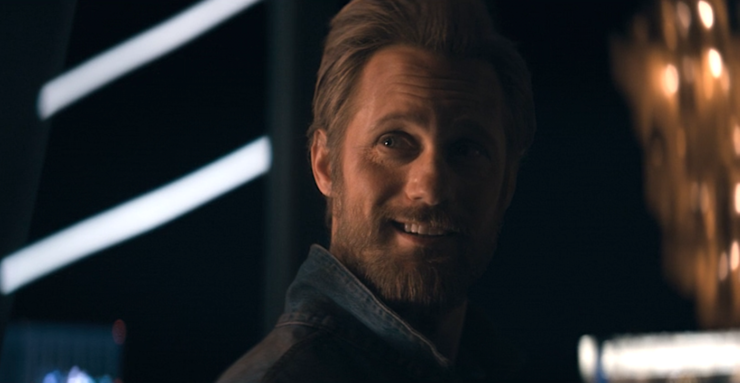I’ve been trying to think through how to write about The Stand. I really liked parts of it, and I bounced hard off other parts. But I think the moment that sums the show up best is that, towards the end of the series, there’s a scene where a character has sex with the Devil. The Devil usually appears as Alexander Skarsgård (exactly how I would appear if I were the Devil) but while the two character are having sex, his usual glamour slips a little, and the scene flashes between a romantic scenario in a rose petal-strewn hotel room with a naked Skarsgard, and some gross and rather violent writhing in a desert, which ends on a closeup of a terrifying monster screaming directly into the camera.
And then, we cut to a Geico ad!
This encapsulates the strongest part of The Stand, which is when it leans into the High Cheese with Serious Undertones And Actual Stakes that is Stephen King at his best. And packaging that between ad blocks adds a frisson of joy to the whole enterprise.
The Stand is considered one of King’s most iconic books. I wouldn’t say best, because I think bits of it are mushy and it’s severely lacking in homicidal clowns, but it is an immense, sweeping look at three different kinds of apocalypse. It’s a book only Stephen King could have written. Any End Times book could give you the horror of a pandemic sweeping the world, with the ensuing paranoia, the collapse of infrastructure, and the attempts to rebuild; any book could give you a religious take on the end times, with an epic battle between good and evil; any book could even give you a nuclear holocaust. But only Stephen King would smash all of these into a single book, and then give us two different Dad Rock characters—one an aging hippie professor and one the literal Devil. Only Stephen King would give us Trashcan Man, a damaged creature who loves fire—like, romantically, sexually loves it—and who has a crush on the Devil because, come on, who has more fire than the Devil? Only Stephen King would manage to have both a fairly feminist plotline about a young girl trying to navigate a dystopia full of incels and terrible boyfriends, and a plotline about multiple women who are Evil Because Of Sex.
The Stand is made up of a cacophony of plot threads, but I’ll sum a few of them up. A weaponized virus known as Captain Trips (because, again, King) gets loose in the U.S. and wipes out most of the population. Some people are simply immune, but no one really knows why. A Texan named Stu Redmond (James Marsden) tries to help the pandemic’s Patient Zero, and, when this doesn’t kill him, is dragged off to a military research facility for his trouble. Aspiring writer/teen creep Harold Lauder (Owen Teague) sets out from Maine with his former babysitter, the secretly-pregnant Franny Goldsmith (Odessa Young). As they travel Harold spray paints messages on buildings and abandoned semi-trucks. At around the same time, wannabe indie rock star Larry Underwood (Jovan Adepo) leaves New York City and follows Harold’s messages across the country. Weeks later, Harold and Franny meet up briefly with Stu, who escaped the facility. Then Stu begins traveling with hippie professor Glen Bateman (Greg Kinnear). Larry picks up a girl named Nadine (Amber Heard) and a boy named Joe. A deaf person named Nick Andros (Henry Zaga) meets up with an intellectually disabled man named Tom Cullen (Brad William Henke). Gradually, all of them converge on Boulder, Colorado.
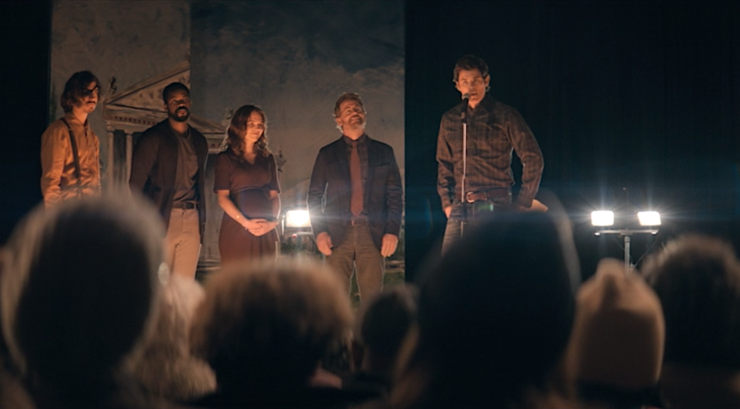
Why Boulder?
All of them have been guided by dreams of a woman called Mother Abagail (Whoopi Goldberg). They’re meant to found and lead the boulder Free State, which will be the post-apocalyptic utopia—if your idea of utopia is khaki, flannels, and dad rock.
Meanwhile, a man named Randall Flagg (Skarsgård) has been drawing people to New Vegas, which is WAY MORE FUN. Flagg has his mental hooks in Harold and Nadine, and is building a totalitarian empire of debauchery with help from a lackey named Lloyd (Nat Wolff).
Naturally the two sides have to fight. And they do! For over 1,152 pages, in the extended edition of the novel. (Forty pages short of Infinite Jest! You win this one, David Foster Wallace!)
In the ‘90s there was a miniseries that never became cult hit that IT did—but it had an A-list cast: Gary Sinise as Stu, Molly Ringwald as Franny, Rob Lowe as Nick Andros, Jamey Sheridan as Randall Flagg, and Ruby Dee as Mother Abagail. I have vague memories of it being pretty stilted, and the effects were a bit too “‘90s television” to work for the scale of the story.
The new version is more successful than its predecessor, but it’s still a very bumpy ride of excellent setpieces and strong performances, but long lapses in logic, and muted characterization that hold it back from being as great as, say, the first installment of Andy Muschietti’s recent take on IT.
To be fair, I didn’t expect to be in month eleven of a pandemic while I watched this thing. As I said in my review of the opening episode, seeing the fictional response to the disease felt false—I never felt the grief and horror was immediate enough. I’m not a frontline worker or a coroner, but I’ve been walking around in a nauseated daze since March. So the idea that these characters who are dealing with, for instance, burying their loved ones, removing bodies from a town so they can reclaim it, digging mass graves, crawling through sewers to escape gangs, freeing women who have been taken captive by sadistic men, etc.—given how screwed up I am after eleven months of relative comfort, these people would be shells of themselves. And I think it would have been a great move for the show to portray that emotional hit a bit more than it does, because it would ground the gross-out moments of the first half and the cosmic horror that settles in over the second half in genuine human experience.
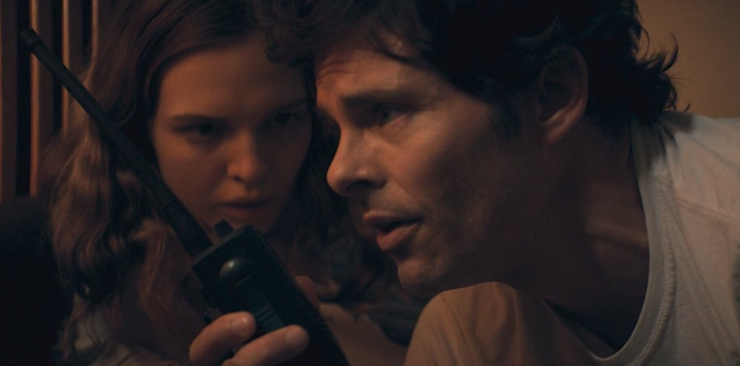
The Stand, like a lot of these stories, plays out a secularized Rapture scenario… or at least, at first it seems secularized. If it was just about a killer pandemic that decimates the human population, and leaves the survivors struggling to rebuild society, then we just have a dystopian thriller, a slightly higher-level Andromeda Strain or Contagion. Instead King veers into the mythic. His intention with the book was to create a modern, American Lord of the Rings—to the extent that when he was able to publish an extended edition in 1990, he went back and updated the timeline and references to try to keep it as modern as possible. The plague is only the opening salvo of his End Times scenario. In the book Captain Trips is a weaponized form of influenza, and when the initial efforts at containment fail, it’s actually released in other countries intentionally to make sure they suffer along with the United States. The new series never checks in with the rest of the world, or confirms that it’s a bioweapon, instead it’s implied that the outbreak is helped along by Flagg and, presumably, tactically ignored by God.
Wound around this narrative is the fact that the survivors are all having dreams of Mother Abagail and Randall Flagg. They choose one side or the other, seemingly without fully understanding what they’re choosing. Those drawn to Mother A end up in Boulder, while the Friends of Flagg travel to Vegas. Once the players are in position, the book tips fully into an epic tale of the battle between good and evil. Most of the people on Mother A’s side accept the idea that she is an emissary of God–but they don’t really debate too much about what that means, or seem to spend too much time thinking about the idea that they are suddenly in a very particular End Times story. (There’s no discussion of which god Mother A is repping, but she only quotes the Hebrew Bible and New Testament.) Those on Flagg’s side don’t seem to dwell too much on the idea that they’ve sided with Hell Itself.
I’ve written about pop cultural End Times before, so I’m not taking us all through that again. But what I find fascinating about The Stand is the way King brought a couple of very different scenarios together for his book. He was working in a milieu of 70s paranoia/conspiracy thrillers/pandemic thrillers, and the resurgence of Rapture fiction like Thief in the Night. (I think it’s good to remember in these volatile days that End Times go in and out of vogue in cycles.) Rather than choosing to write a purely scientific story, like The Andromeda Strain, or a purely spiritual one, he took a “Why not both?” approach and treated a cosmic battle with the same seriousness as the aftermath of a man-made plague.
Which becomes a little bit of a problem for the series. At its heart The Stand is claiming that the pandemic was sent by the Devil (but God allowed it) and that in the plague’s aftermath God and the Devil are gathering the remaining U.S.-ians together into two opposing camps who will then battle for supremacy as the proxies of two supernatural forces. Many of the people in Boulder seem to know this. The people of the Boulder Council, Stu, Larry, Franny, Glen, and, Nick, explicitly know this. Which casts every decision they make in a giant cosmic spotlight, because I think it’s safe to assume that if you’d lived through a pandemic at the level of Captain Trips, been guided across a post-apocalyptic U.S. by visions of Whoopi Goldberg in a cornfield, and then found yourself in a new utopian city that was ordained by God (which by the way exists apparently) that that would affect your outlook on life. And yet people just kind of seem to… keep going? Do normal stuff?
And meanwhile any time the series cuts to Flagg the show becomes, as a mentioned, WAY MORE FUN. I know, I know, he’s literally the Devil, and yes there’s a giant dark side to New Vegas, i.e.; it’s a totalitarian state, and people are forced to fight in a big coliseum and everyone there is going to Hell eventually, but…it looks incredibly fun. Appealing. This is where the queer people are, this is where women who would be considered “overweight” in our world walk around in bustiers looking fabulous, this is where everyone, regardless of gender or sexuality, is covered in glitter. There are some downsides. First, yeah, the Hell thing. And like a lot of King’s work, this bit of the adaptation seems to be stuck in the ‘80s for some reason. Flagg projects himself like Max Headroom over a Thunderdome-esque coliseum, and there’s enough cocaine flying around to power a dozen Weeknd albums. And, more problematic, sex and violence are conflated as “evil”—especially frustrating since this is where all the post-apocalyptic queerness seems to concentrate—but the New Vegas sections are so much more vibrant than the Boulder sections that it’s hard to stay invested in the triumph of good.
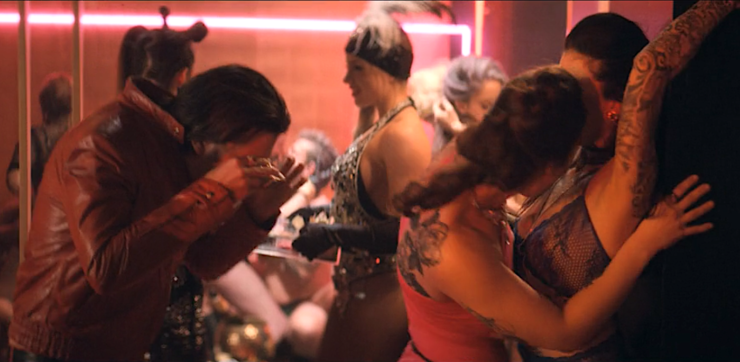
This is one of the problems with the series as a whole: it’s really fun in fits and starts, but some of the showrunners’ decisions have sucked the tension out of it. During the first half the show, when it might have been better to lean into the terror of living through the pandemic, the show skips around in time like a Christopher Nolan-helmed reboot of Quantum Leap. If a viewer who hasn’t read the book already knows that Stu and Franny are a couple in Boulder, that makes some of the scenes between Harold and Franny less fraught. Later, once all the players are gathered, the show gives us flashbacks to journeys like Nick and Tom Cullen’s which would have been better as linear stories. Where the various journeys people make could have been layered together to make us wonder if they’ll get to Boulder, too often in the early episodes, the show treats the characters’ futures as inevitable–Which, again, could be interesting as a way to underline the idea that these characters are fated to fulfill certain destinies! But that’s the kind of thing that works better when a viewer looks back at the shape of the series.
And then sometimes there are just choices with writing and editing that I felt undercut the series. A good example is the way the show frames the Boulder Council’s decision to send spies into New Vegas to get info on Flagg. In the book this decision comes at a very specific point, when it makes a little more sense. But in the show, they’re acting directly against Mother Abagail’s wishes–and thus, as far as they know, God’s. Which is a really interesting decision for people to make in this context! But the way the show deals with this plotline is by showing us the Committee interviewing their potential spies, rather than with them wrestling with the ethical ramifications of sending them. Then, the scene when Mother A finds out is weirdly rushed and muted, even though her reaction ends up leading to a huge plot twist. There are a number of times when the show saps the potential tension in this way.
When King wrote the book in the ‘70s, the choices he made were quite progressive: an elderly Black woman is God’s representative on Earth, while the Devil takes the form of a white male Classic Rock enthusiast. The story’s biggest Christ figure is the deaf man who chooses compassion in the face of abuse. One of our main POVs is a kind, young college woman who got pregnant by accident, and who ends up having to lead society a few months before facing new motherhood. One of the book’s biggest heroes is a gentle man with intellectual disabilities, and one of its worst villains is a white incel.
Some of the new series’ updates work well.
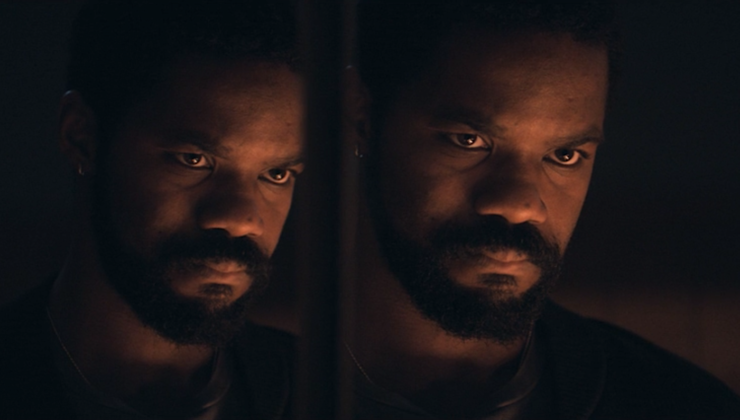
Council member Ralph, a white farmer in the book, is replaced by Ray Brentner (Irene Bedard), an Indigenous woman who is one of Mother Abagail’s closest confidantes. Nick Andros is now the orphaned son of an Ecuadoran refugee. Larry is a Black indie singer struggling with addiction, rather than the somewhat more shallow fading pop star of the book. On the “evil” side of the spectrum, Harold’s incel tendencies are made more complex, and that combined with all the echoes of King’s own young life as a writer gives the character more depth. Flagg’s right-hand man Lloyd is now a troubled, insecure young man who fakes being a cop killer to convince people he’s tough.
But on the other hand, it also got to me that the only instances of queerness that I saw were part of the New Vegas debauchery. (You’re telling me the Boulder Free State rebuilt itself from nothing without the benefit of lesbians? Doubtful.) I don’t think I saw any queer couples among the Boulder residents, while New Vegas was more than comfortable using diverse sexual configurations as background as the main characters walked around being evil. As I mentioned above, too, we don’t see any examples of people practicing Islam or Hinduism or anything, and Mother Abagail is explicitly Christian, so we get no sense of how people of other faiths respond to suddenly being part of this Divine Plan. (We do get a few scenes of Glen being amused by it.) And to be clear, I’m not saying that the show’s creators needed to tick off checklists, here, just that if your goal is to make an epic that reflects America As It Is Now, you have to give us real, layered diversity. Because despite what some people, for reasons that continue to baffle me, might want, the US is in fact an overflowing fondue of different people and cultures. It’s kinda what makes us great, when we can be arsed to be great.
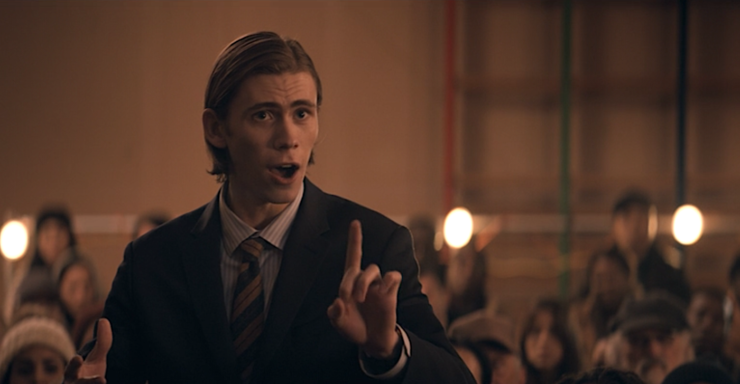
The performances are uniformly excellent, even when the script is shaky. Owen Teague brings a jittery, spiteful energy to Harold (at times creeping close to becoming a Jack Nicholson impression) but he also lets you see that there is a better person in there. You can see how Franny, who has known Harold since childhood, might keep hoping his good instincts will win out. You can see why this person would be seen as a lost soul who just needs some love in the utopian society of Boulder. Amber Heard brings some heft to Nadine’s Flagg-based emotional conflict, especially when she’s playing against Jovan Adepo’s warm presence as Larry. James Marsden and Odessa Young both do solid work as the ostensible leads, Stu Redman and Frannie Goldsmith, but the characters are both too bland–again, I know I’m harping on this, but living through this kind of event would leave wayyy more damage–Franny has to bury her dad in the backyard, Stu loses his wife and his child, and is taken prisoner by the remnants of the U.S. government for a while. They’ve seen some shit. But their characters remain so upbeat and hopeful that it became hard for me to be invested in them even when they did objectively heroic things. Greg Kinnear gives probably my favorite performance as Glenn, and Katherine McNamara and Fiona Dourif are both fantastic as two of the leading members of New Vegas, Julie and Rat Woman. (Rat Woman, I wanted so much more time with you.)
Now, leaving behind the good, let us move on to the transcendent.
Ezra Miller is unhinged as TrashCan Man. He flails through his scenes in leather S/M wear and a distressingly white-flesh-toned codpiece, screamwhispering “MY LIFE FOR YOUUUU” to Flagg and jerking off to explosions. In short, he’s perfect in the role.
Here’s a shot of him pre-Flagg:
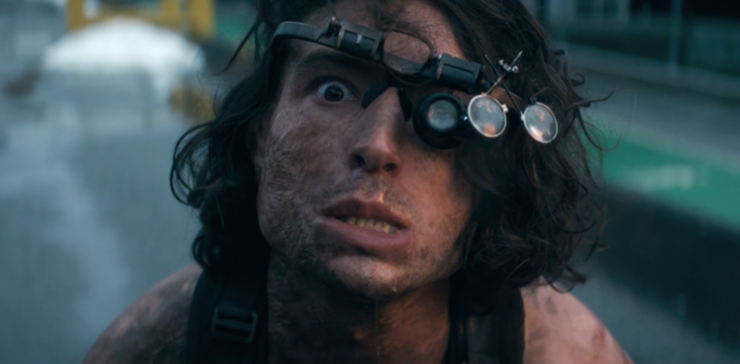
And here’s a shot of him meeting Flagg:
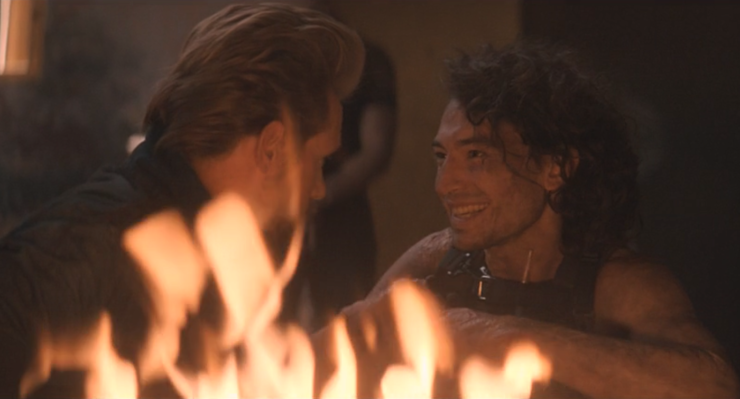
This is exactly what you want from this character.
Alexander Skarsgård is frankly amazing as Randall Flagg. He’s languid and deadpan, and makes being evil look incredibly fun until suddenly he’s dead-eyed and threatening Mother Abagail. The interesting thing to me is that I would argue that in this adaptation of the story his actual mirror is not Mother A, or Stu Redmond, but Glen Bateman. Flagg, at least for most of the series, has a sort of ironic detachment from the events around him. He’s amused by human misery, by earnestness, by moral compasses. Confronted by one of the good guys, he fakes his death to fake her out. Then, when he comes back to life and startles her, he doesn’t mock her for falling for it–instead he says, “You dig that? I learned that from my old lover, Konstantin Stanislavsky. He said great acting is all about reacting.” He isn’t the boogieman trying to terrify her into betraying herself, he’s simply trying to make her see reason. That’s so much worse. On the other side is Glen, a man who remains a skeptic and “the world’s preachiest atheist” in the face of apocalypse, even after he seems to be part of a Divine Plan. (Respect.) Glen regards both the fanatical love of Mother Abagail, and the frenzied worship of Flagg, with equal suspicion.
I really wanted to like this show, but I think the big issue for me is that theme is overly simplistic. Where in the book you get page after page of internal monologue, and dialogue between characters, raising the emotional stakes and grounding the cosmic battle in human lives, the show keeps itself too distant from the characters’ emotions to pack the punch it’s trying to land. But to talk about why I’ll need to get into some spoilers for the end of the series now, so if you’re not caught up, please skip down to the bolded text a couple paragraphs hence.
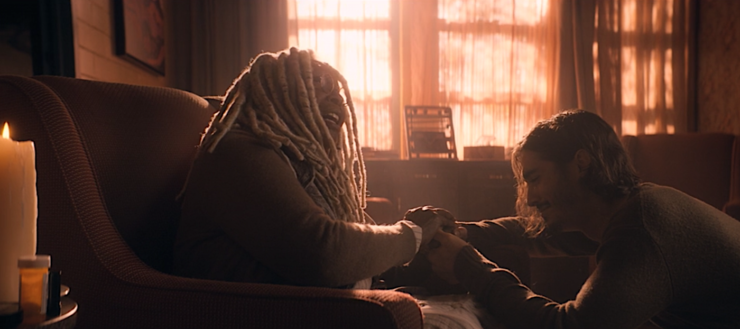
SPOILERS BEGIN
If The Stand had committed fully to the feints toward Glen vs. Flagg I mentioned above, it could have built into more of a story of inquiry vs blind fanaticism. Instead it sort of comments on that, but also rewards other characters for their blind acceptance of Mother Abagail. If the writers had committed to giving Flagg’s right-hand man, Lloyd, a redemption arc, they could have made his journey mirror Harold’s. The final confrontation in New Vegas between Larry, Ray, Glenn, Lloyd, and Flagg could have been about Lloyd, after a life of fuck ups, finally having to make a choice. Instead he makes a series of mistakes, shoots Glen in a panic, seems to have a crisis of conscience, kind of says no to Flagg, but also kind of tortures Larry and Ray when he’s told to, but also chooses to tell Larry that he always loved his music. He yells that Larry and Ray should be released, but doesn’t make any move to do it himself. Flagg stands back and allows all of it. The crowd doesn’t turn on Larry, Flagg doesn’t kill him–he just dies in a fairly comic way during the final collapse of the casino. And I love a good comedic death, but this seemed rushed given that the show was also giving Lloyd more inner life in these last episodes.
I know, I know, I tend to harp on religious–but this is a series about a battle between God and the Devil, so I think it’s valid. If the show had mused on its religious aspects the whole time, it could have shown us Larry and Stu making decisions because of personal religious conviction, Ray making them because of her love for Mother A, and Glen respecting their beliefs but rejecting the spiritual underpinnings. That would have been cool! A reflection of the multifaceted society we strive for in this country when we’re not being awful. Instead, no one but Glen wants to talk about larger questions, until Stu gets hurt on the way to Vegas. Then, suddenly, Stu is goading Larry into reciting bits of Psalm 23 out of nowhere (that’s the “I will fear no evil” one), and Larry is taking deep personal meaning from this. Glen gets an amazing final scene telling them all to reject fear, but that’s cut short by Lloyd. Then once Larry and Ray are imprisoned, Larry returns to the Psalm as he dies, screaming “I will fear no evil!” at Lloyd and Flagg, but until one episode before we never got a sense that this would be his rallying cry.
The show repeats this in its final episode, when Franny has to reject Flagg one last time. She’s grievously injured, and Flagg tempts her with the idea that he can heal her and guarantee her child’s safety. She refuses him and escapes, but almost immediately runs from him, straight into the arms of Mother Abagail. Which, yes, it’s a vision, so logical sense doesn’t matter, but Mother A talks about Job, and feeds Fanny a very simplistic morality of blind obedience to God no matter how difficult life gets…but then Franny returns to life and is magically healed. How much more meaningful would this temptation/rejection scene be if Flagg had visited Franny throughout the series, as he did Nadine? Or if she reject Flagg, only for Mother Abagail to tell her that her leg would never properly heal? (Part of my frustration with fantasy shows always falling back on Job in these kinds of stories–Job ends with a new family, farm animals, wealth, etc. It’s a happy ending, from a certain point of view. How much more interesting would it be if the restoration doesn’t happen, and you just have to keep slogging along?) If you’re going to create a show about enormous moral choices and their consequences, don’t sugarcoat how those choices turn out.
SPOILERS END
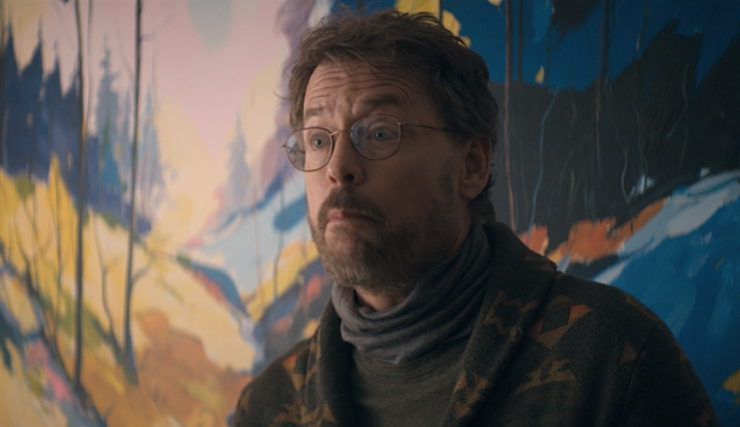
To come back to what I thought was the strongest throughline: the reason I love mentally pitting Glen against Flagg, rather than Stu or Franny, or even Mother Abagail, is that he and Flagg both seem to be hanging back and watching the action around them more than participating in it. This seemed to be part of the general update to the show, and felt like a genuinely new direction for this story. By making part of the End Times scenario revolve around bullies who deny science, and a Devil who exploits them, it’s oddly—perhaps even unintentionally—relevant to our current moment.
And it isn’t just that. Just as when King updated the book for the 1990s, so the series creates an End Times scenario that is happening in our future. Harold amps himself up by staring at a photo of Tom Cruise that he’s taped to his mirror. His friend Teddy muses on whether The Rock was immune to Captain Trips. But most startling, but also, I guess, inevitable, is a scene in New Vegas. After playing up the idea that this the city is a pocket universe where it’s always 1987 (but never Christmas), the series veers hard into NOW toward the end of the series. Flagg’s people imprison some of the Boulder residents, housing them in freestanding chain link cages that are horrifically reminiscent of the camps on the U.S. border. The prisoners are made to sit in a mock trial that matches up with incidents in the book…but it’s also broadcast as a reality TV show, and at a certain point the character who is positioned as the most “intellectual” of the Boulder crew comes out and says that Flagg’s acolytes are: “…scared, lost people. And following someone makes them feel a little less lost.” Then, in a nod to one of King’s ongoing themes, he points out that Flagg only has power because of people’s fear. Later the acolytes chant three-word slogans like “Make them pay!” and “Burn them down!” in unison, and it was rather difficult not to see and hear the last five years all balled up into a couple of scenes and chucked in my face. And I mean that as a compliment.
Obviously there was no way that the makers of The Stand could have predicted that we’d all be watching the series in the midst of a pandemic, but I do think that leaning even harder into updating the story to mirror our reality TV’d, Twitter-addled, politically exhausted consciousness would have made the commentary sharper. I think King fans will love parts of the show (I certainly did) but I also think that it needed to be a bit more over-the-top with its horror, and a bit more thoughtful with its reflection of society, to rise to the epic level of the book.
Leah Schnelbach is rather startled to see how much they vibe with Randall Flagg in this iteration of the story? Something to contemplate. Come discuss the End times with them onTwitter!










